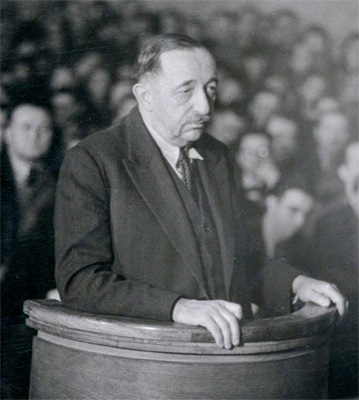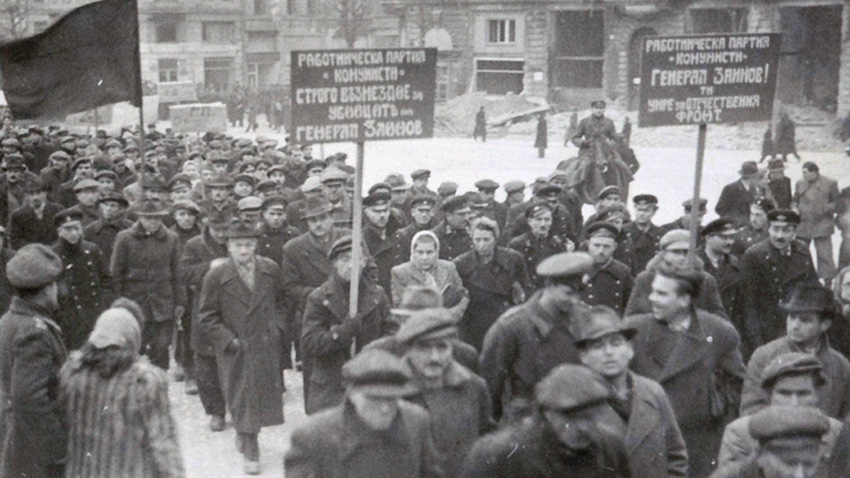The year 1945 began with… death. On 1 February, 3 regents, 8 royal advisors, 22 cabinet ministers, 67 MPs from the 24th National Assembly, 47 generals and senior army officers were sentenced to death with no right of appeal. The executions were carried out that same night. The people were driven to a bomb blast hole in the region of the Sofia cemetery by truck and there, they were shot dead one by one. Professor Alexander Stanishev, a doctor of world renown begged to be allowed to examine and declare them dead so they wouldn’t be buried alive. He too was killed as he knelt by the last man who had been gunned down. The corpses were buried in slag, later a dunghill was heaped over them. No protocol of the executions was kept. The people sentenced to death were not allowed to see their parents, their children, their wives. And their relatives were deprived of the right of embracing them one last time.
 The People’s Court – an ad hoc tribunal, set up months after the communist coup in Bulgaria in 1944, in contravention of the then effective Turnovo constitution, to be used as an instrument of the communist terror - tried 135 cases with 11,122 defendants in 1945. No one was allowed to talk about this until the fall of totalitarianism in 1989. Here is writer and journalist Stefan Grouev’s comment of these events, a recording from the Bulgarian National Radio’s Golden Fund:
The People’s Court – an ad hoc tribunal, set up months after the communist coup in Bulgaria in 1944, in contravention of the then effective Turnovo constitution, to be used as an instrument of the communist terror - tried 135 cases with 11,122 defendants in 1945. No one was allowed to talk about this until the fall of totalitarianism in 1989. Here is writer and journalist Stefan Grouev’s comment of these events, a recording from the Bulgarian National Radio’s Golden Fund:
“In the Nuremberg trials that set the world ablaze, 12 people were sentenced to death. In Bulgaria that was the number of death sentences passed by the first chamber of the first court. What followed was wholesale, hysterical, sadistic slaughter, the annihilation of one whole class. Obviously premeditated, aiming to root out any chance of resistance or of jeopardizing the new government. It was perpetrated by different people for all kinds of reasons, but was orchestrated by Moscow. Painful as it may be, in the first years even I, along with other people, would take comfort in the thought that it wasn’t something we Bulgarians had come up with, that it was a Soviet, that it was Stalin’s brainchild, but truth be told, the executioners were sadistic and obsequious, paid lackeys – Soviet citizens of Bulgarian origin.”
At Moscow’s instructions, the sentences were fixed beforehand even down to the percentages. On the night before the People’s Court, Vulko Chervenkov, member of the Communist Party leadership, reported to Georgi Dimitrov, former Communist International leader and MP in Soviet parliament, sending him a cable in Russian: “The sentence will be carried out on Thursday, February 1. From the MPs, we propose a death sentence for 70 percent!” The series of cables to Georgi Dimitrov make it clear that the sinister farce, called People’s Court aimed to legitimate the massacres, without trial or sentence perpetrated after the communist coup on September 9, 1944. The “most vicious enemies” included journalists and writers like Yordan Badev, Nencho Iliev, Danail Krapchev and Rayko Alexiev. Krapchev was cudgeled to death in Gorna Jumaya, Alexiev was killed at the Central Militia Department in Sofia.

At the beginning of 1945, the Central Courthouse in Sofia was bursting at the seams – there were so many defendants waiting for their cases to be tried, so some of them were transferred to the Sofia University building. By April that same year death sentence had been passed on 2,730 people. More Bulgarian generals and senior army officers were killed than in all wars Bulgaria fought after the country’s liberation from Ottoman rule in 1878.
In 1996, the Supreme Court of the Republic of Bulgaria repealed some of the Peoples’ Court sentences, the motive – “lack of evidence”. As of 2011, February 1 has been marked as the Day of thankfulness and a tribute to the memory of the victims of the communist regime.
English version: Milena Daynova
Photos: archives.bgThe Other Bulgaria – these were the thousands of Bulgarians outcast abroad after the pro-Soviet coup d’etat on 9 September 1944. Scattered around the globe, they carried the image of their motherland, its controversial past, tragic present..
In a piece of correspondence, great Italian composer Giuseppe Verdi once wrote: „Do not try too hard to teach a singer how to sing. Provided he has got a devil on his back he knows how to sing.” These words perfectly suit Ghena..
„I had mostly poor marks in Bulgarian language and literature. I got them because I could not possibly write an introduction, a body copy and a conclusion in an essay. I begin as I like and wind up the story as I like.” This is what..

+359 2 9336 661
